Are you looking for high-quality steel flat bars at a reasonable price for your project? Discover a variety of long-lasting and dependable steel flat bar solutions to fit your requirements. These adaptable metal bars provide strength and stability in a variety of applications, including construction and manufacturing. Find the ideal steel flat bar with the correct dimensions and specifications to ensure the success of your project. Refer to this post right away to get the most bang for your buck.
Steel flat bars are long, rectangular metal bars with a flat surface and sharp edges. It is usually made of carbon or alloy steel. The bar’s width and thickness are uniform along its whole length, distinguishing it from other bar shapes such as round or square bars.
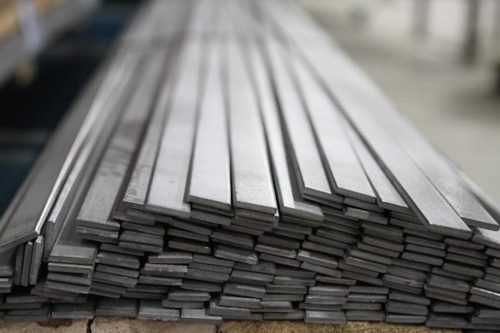
Steel flat bars are extremely versatile and are utilized in a wide range of industries and applications. They are ideal for structural support, framework construction, fabrication, and reinforcement due to their high strength, durability, and stability. Steel flat bars can be welded, machined, bent, or curved to fit project specifications.
Depending on the needed qualities and application requirements, steel flat bars can be obtained in a variety of grades and finishes, including hot-rolled, cold-rolled, and galvanized choices. Because of their strength, versatility, and ease of use, they are frequently utilized in industries such as construction, manufacturing, infrastructure, and fabrication.
Steel flat bars come in a variety of sizes to suit a variety of purposes. The following are some popular steel flat bar sizes:
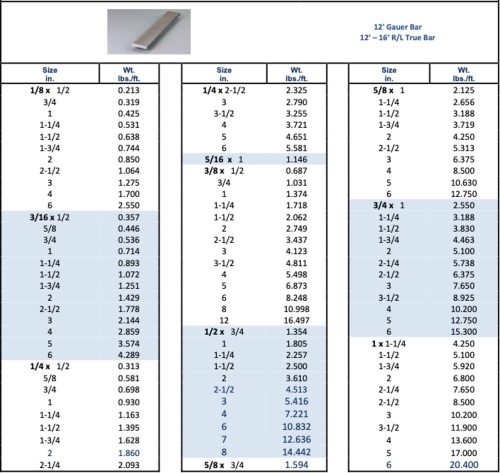
The steel flat bar dimensions can vary depending on the specific requirements and standards. Generally, flat bars have a rectangular cross-section with a flat top surface and sharp edges. The dimensions are typically specified by the width (or breadth) and thickness.
It is important to note that the dimensions of steel flat bars can vary depending on the specific standards, grades, and suppliers. Different countries or regions may have their standard dimensions for steel flat bars. Therefore, it is advisable to refer to industry standards, and specifications, or consult with reputable suppliers to obtain precise dimensional information for the specific type of steel flat bar required for your project.
The steel flat bar weight can be calculated using the formula:
Weight (in pounds) = Width (in inches) × Thickness (in inches) × Length (in feet) × Density
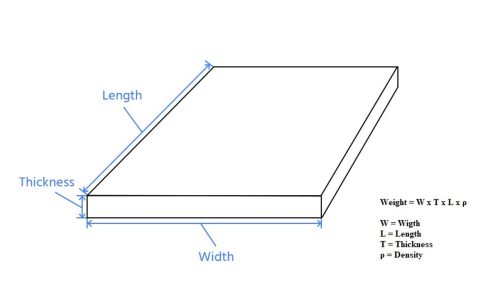
Here’s an example calculation:
Let’s say we have a steel flat bar with the following dimensions:
Width: 1 inch
Thickness: 1/4 inch
Length: 6 feet
Density = 3.402
Using the formula, we can calculate the weight:
Weight = 1 inch × 1/4 inch × 6 feet × 3.402
Weight = 0.25 pounds per foot × 6 feet × 3.402
Weight = 0.25 pounds per foot × 20.412
Weight = 5.103 pounds
Therefore, the weight of the steel flat bar in this example is approximately 5.103 pounds.
It’s important to note that this formula provides an estimation and the actual weight may vary slightly due to manufacturing tolerances and specific steel grades. For precise weight calculations, it is recommended to consult steel suppliers or refer to industry standards and specifications.
Steel flat bars have a wide range of applications across various industries. Some common uses of steel flat bars include:
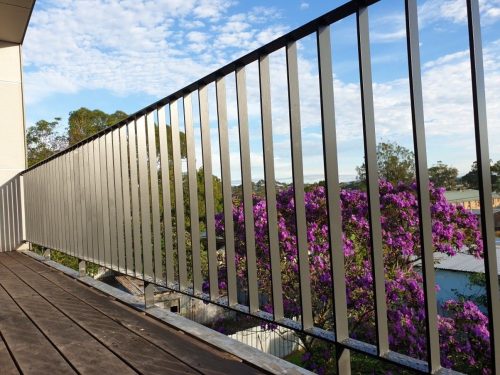
These are just a few examples of the common uses of steel flat bars. The versatility and strength of steel flat bars make them suitable for a wide range of applications in various industries.
In the United States, the average daily price of HRC fell by 5 USD/ton from the previous week to 637 USD/ton FOB Middle East (702 USD/ton); CRC fell by 3 USD/ton. HDG fell by 0.1%. HRC’s delivery time can take up to 5.3 weeks. Steel plate prices jumped to 720 USD/ton (794 USD/ton) FOB Middle East last week.
The average daily price of HRC in Northern Europe fell by 4 EUR/ton. Only HDG increased by 6 EUR/ton to 557 EUR/ton (755 USD/ton), while CRC declined by 1.1%. HRC’s delivery times were longer last week. Steel plate factory prices increased by 3 EUR/ton to 529 EUR/ton (717 USD/ton).
HRC’s average daily reference ex-factory pricing in Southern Europe fell by 4 EUR/ton. CRC fell by 5 EUR/ton to 526 EUR/ton (713 USD/ton). HDG prices have risen by 11 EUR per ton. Steel coil delivery times are longer for all types of steel coils. The price of steel plates has risen by 6 EUR per ton. Rebar fell by 4 EUR/ton from the previous week to 477 EUR/ton (646 USD/ton).
Steel flat bar prices in Vietnam range from 14,000 VND to 20,000 VND.
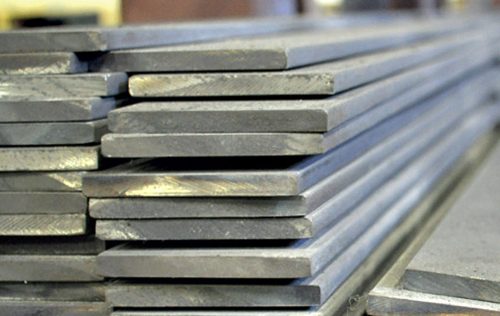
The price of steel flat bars can vary depending on various factors, including the grade of steel, dimensions, quantity, market conditions, and the supplier or distributor. Additionally, prices can fluctuate over time due to changes in raw material costs and market demand.
To get accurate and up-to-date pricing information for steel flat bars, it is recommended to contact local steel suppliers, metal service centers, or distributors. They can provide you with specific pricing details based on your requirements, such as the dimensions, quantity, and any additional specifications needed.
It’s important to note that steel prices can be subject to regional variations, so it’s advisable to reach out to suppliers in your specific location for the most accurate pricing information. Additionally, comparing prices from multiple suppliers can help you find the best value for your specific needs.
A steel flat bar with holes is a flat-shaped steel bar that has perforations or holes along its length or width. These holes can be in various shapes, sizes, and patterns, depending on the specific design requirements.
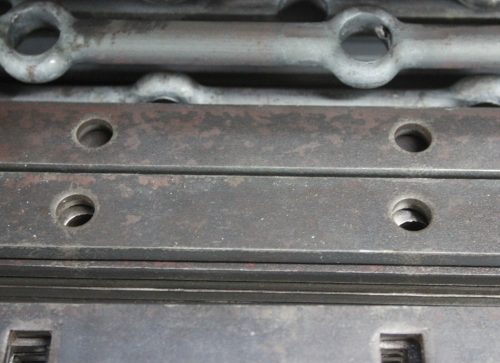
Steel flat bars with holes are commonly used in a range of applications that require enhanced functionality, ventilation, or structural support. Here are a few examples:
Steel flat bars with holes are used in the construction of shelving units and storage systems. The holes allow for adjustable shelf placement, easy installation of brackets or hooks, and improved airflow.
Flat bars with holes find application in racking systems for warehouses and industrial facilities. They provide a versatile framework for securing and organizing materials, and the holes can accommodate accessories like dividers, hooks, or clips.
Steel flat bars with decorative or patterned holes are utilized in architectural applications. They can be used as grilles or screens for facades, privacy panels, sunshades, or ventilation elements, adding both functionality and design appeal.
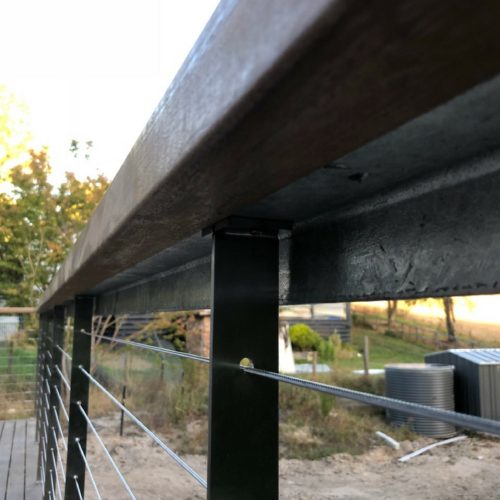
Flat bars with drainage holes are employed in applications where water management is essential. They can be used as grates or covers for drainage channels, gutters, or surface water collection systems.
Steel flat bars with holes can be integrated into machinery and equipment designs to provide structural reinforcement, mounting points, or attachment areas for components and accessories.
The specific pricing for steel flat bars with holes will depend on factors like the size and thickness of the bar, the hole pattern and size, the grade of steel, and market conditions. Prices can vary between suppliers and regions.
Learn more
In conclusion, when embarking on a project that requires steel flat bars, it is essential to find high-quality products at competitive prices. Steel flat bars are versatile components widely used in construction, manufacturing, and various industries. By prioritizing quality, you can ensure durability, strength, and optimal performance for your project. Additionally, finding competitive prices helps manage costs effectively. Collaboration with reliable suppliers who provide a combination of high-quality steel flat bars and competitive pricing is critical to ensuring that your project satisfies both quality standards and budget needs.
Address
Website: https://stavianmetal.com
Email: info@stavianmetal.com
